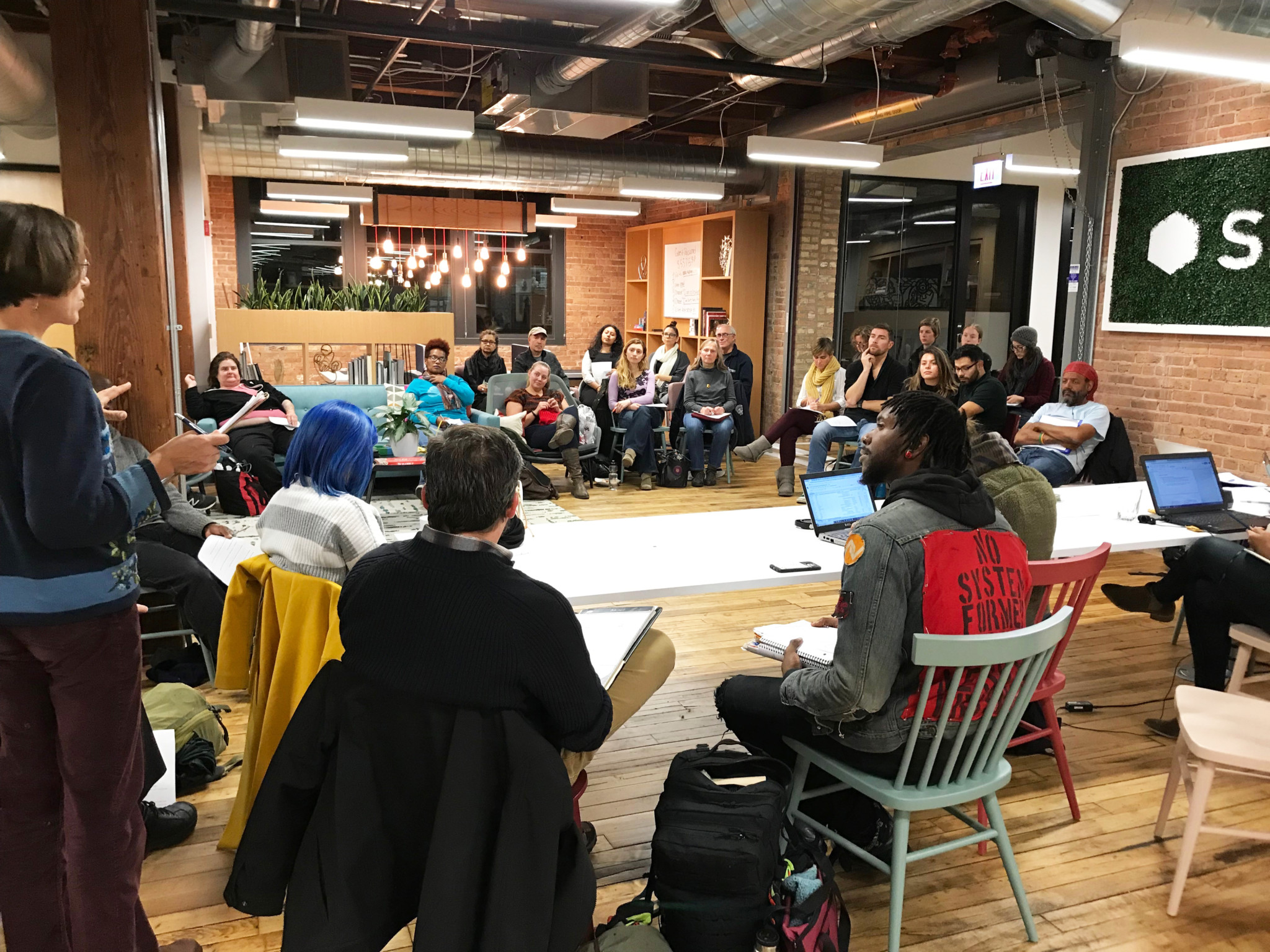On a Thursday in early November, around forty people gathered at a coworking site in the West Loop to attend a “(Re)Launch” of the Ward Ambassador program run by Advocates for Urban Agriculture (AUA), a network that supports urban farms, gardens, and sustainable food initiatives in the Chicago region.
AUA Programs Manager Nick Lucas led the session, first prompting attendees to turn to their neighbor and answer two questions: “Why are you interested in urban agriculture?” and “How have you been civically engaged?” These two questions laid out a roadmap for the workshop that was designed to help Chicago residents gain the tools and know-how to advocate for urban agriculture with their aldermen.
During the workshop, Lucas guided the audience—which included school gardeners, backyard gardeners, and farmers—through the history of Chicago’s relationship with urban agriculture, the origins of AUA, and exercises, including writing practice scripts, to prepare attendees for building relationships with aldermen.
AUA dates back to 2002, but began organizing in earnest in 2007, in response to an introduced ordinance that would have banned backyard chickens in Chicago. “The measure passed out of committee and was close to becoming law,” Lucas explained. “Chicken keepers and urban agriculture advocates launched a grassroots effort to stop the ban and [the ordinance] was ultimately defeated, only thanks to the strength of pre-existing relationships many already had with ward offices.”
Out of this organizing came the realization that continually building and maintaining relationships with local elected officials is important. The Ward Ambassador Program, launched in 2016 when AUA expanded its staff and capacity, is working to achieve just that. AUA hosts several workshops a year across the city — the aim is to have trained volunteers in each of the fifty wards.
And it’s paid off: Ward Ambassadors canvassed their aldermen in 2017 to support the Good Food Purchasing Program, a policy recently adopted by both Chicago and Cook County that incentivizes Chicago Public Schools and other government agencies to purchase regional food that’s produced with strong labor and environmental practices.
Since its inception, AUA has worked on an array of projects, including developing resource gardens for urban farmers, building the Chicago Urban Agriculture Mapping Project, a map of urban agriculture projects across the city, and organizing volunteer days at community gardens and urban farms across the city.
The latest Ward Ambassador training comes in advance of the upcoming municipal election “The vision for Ward Ambassadors is that this is a long-term initiative, beyond and larger than any single election, candidate, or specific issue,” Lucas wrote over email. “That said, elections and specific issues provide an immediate urgency and vehicle for rallying citizens and raising civic awareness, and we hope to harness and translate that energy into longer-term engagement in the furtherance of our goals.” These goals include having Ward Ambassadors in all fifty wards and ensuring that urban agriculture and food systems issues are on the radar of all candidates, whether they’re running for city council or mayor.
The evening concluded with some tips for building relationships with your aldermen. Before initiating a meeting with an alderman or their staff, Lucas advised checking what ward you live in, who is your alderman, the urban agriculture landscape within your ward, and, last but not least, checking that you’re registered to vote.
Once residents have completed this “homework,” Lucas said, the best way to engage with aldermen is to introduce yourself, thank them for taking the time to speak with you, and introduce AUA and the Ward Ambassador Project. Then, Lucas suggests, ask your alderman if they are interested in or familiar with urban agriculture and any relevant projects happening in the ward, and, finally, to share any urban agriculture policy issues of concern to you or other ward residents.
At the conclusion of the workshop, Lucas emphasized that the Ward Ambassador program is not focused solely on organizing around a particular election, but rather on building a coalition of ambassadors who are developing withstanding relationships with city officials in Chicago’s neighborhoods.
The next Ward Ambassador training will take place at KAM Isaiah Israel, 1100 E. Hyde Park Blvd. on Sunday, January 20, 10am–10:45am, as part of the annual Martin Luther King, Jr. Food Justice & Sustainability Weekend. The training is free and open to the public. For more information, contact ambassadors@auachicago.org.
A Chicago native, Dejah is an analyst at Civic Consulting Alliance and is working with the West Side United project. In her free time, Dejah enjoys traveling, gardening, roaming bookstores, and biking along the lake. Her last piece for the Weekly was an essay about the links between food access, segregation, minimum wage, and racism.



